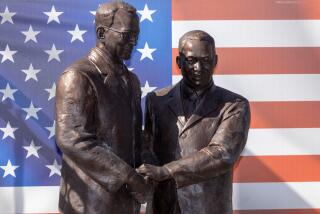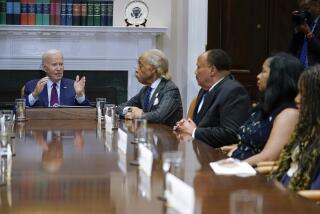Botha Reported Outraged as Coretta King Cancels Meeting
- Share via
CAPE TOWN, South Africa — At the urging of South Africa’s black anti-apartheid activists, Coretta Scott King on Tuesday abruptly canceled a meeting she had requested with President Pieter W. Botha.
Stunned and angry, Botha was left standing with his aides at his official residence, ready to welcome Mrs. King, the widow of assassinated civil rights leader Martin Luther King Jr. What would have been a political coup for him had turned into a remarkable snub.
The 70-year-old president was described by several who saw him as “livid and outraged” and “ready to explode” when he was told, 15 minutes after the noon meeting was to have begun, that Mrs. King was not coming.
“After being in South Africa for a week, I now feel I need more time to acquire a better understanding of the complex problems here in order to have a more substantive meeting with President P. W. Botha,” Mrs. King said in a statement distributed to newsmen gathered outside Tuynhuys, the presidential residence.
Sends Letter of Regret
But she acknowledged the strong opposition that the proposed meeting had aroused among anti-apartheid activists, many of whom said they would not talk to her if she met with Botha.
“I have great respect for the black leadership of South Africa that has struggled so determinedly and courageously to end the wretched, inhuman and immoral practices of apartheid,” she said.
Robert Brown, the black businessman from North Carolina who might have become the U.S. ambassador here had his appointment not run into political difficulties in Washington in July, was chosen to deliver a “letter of regret and explantion” from Mrs. King.
Grim-faced, Brown walked into the presidential mansion and, after 10 minutes, came out shaking his head to newsmen to signal that the meeting was off.
Later, the government’s Bureau of Information decried the “extraordinary local and international pressure” to which Mrs. King had been subjected since arriving in South Africa last week. In a statement issued in Pretoria, the bureau said:
“Mrs. King’s frustrated attempt to visit the state president and by so doing to be informed of the positive socioeconomic and political reforms in South Africa is yet again a sad reflection on those who find themselves in a make-believe world of political fraud and who are unable or unwilling to have their actions exposed to the harsh light of reality.”
Victory for Coalition
What was lost, the bureau said, was an opportunity for “influential but uninformed people to become less gullible and better equipped to act objectively.”
What was also lost was a rare chance for Botha to claim even a small measure of international recognition of his efforts at step-by-step political reforms here. A camera crew from the state-run television network, as well as photographers from pro-government newspapers, had been gathered to record his meeting with Mrs. King.
Mrs. King’s cancellation of the meeting was regarded as a significant victory for the United Democratic Front, a coalition of 650 anti-apartheid groups, which had said she would have to choose whether she was “with the people or against the people.”
“We want her to state clearly that she is on our side,” said the Rev. Allan Boesak, president of the World Alliance of Reformed Churches and a founder of the United Democratic Front.
“When P. W. Botha’s hands are dripping with the blood of our children, she cannot come here, being who she is and representing what she does, and then talk to him as if nothing has happened,” Boesak declared.
Winnie Mandela, wife of imprisoned African National Congress leader Nelson Mandela, had also refused to meet with Mrs. King, setting the policy line for other anti-apartheid activists.
Even Archbishop Desmond Tutu, her host in Cape Town, distanced himself from Mrs. King’s “mission of dialogue.” He told newsmen: “I have not been involved in that. Who she sees is up to her.”
Mrs. King’s party is now trying to reschedule meetings with the opposition leaders, according to members of the group.
Sought Dialogue
Mrs. King’s acceptance that she had, in effect, to choose sides could well become a precedent for other foreign visitors and, anti-apartheid activists believe, could lead to the further international isolation of South Africa’s white-led minority government.
Mrs. King had earlier emphasized her desire to meet with a broad cross-section of black and white political leaders. “It’s important to dialogue with all sides,” she had explained. “It’s very important to have dialogue with people who hold opposing views. It is not an easy thing to do, and we are trying to begin this process in South Africa.”
Mrs. King also canceled a planned meeting with Zulu Chief Mangosuthu Gatsha Buthelezi, one of the country’s most powerful black leaders but a political outcast among more militant government opponents because of his moderate stance.
Buthelezi said in a statement that he felt he should apologize to her “for the indignity which the pressures that have been exerted on her must have made her experience.” When Mrs. King telephoned to apologize for canceling their meeting, “my heart bled for her as the widow of a figure we revere for being subjected to these kinds of dirty political pressures,” Buthelezi said.
Mrs. King, who is now president of the Atlanta-based Martin Luther King Jr. Center for Nonviolent Social Change, came to South Africa last week to undertake what she and other black Americans hoped would become a mediation effort between the country’s white leadership and its voteless and impoverished black majority.
When she returns to the United States at the end of this week, a spokesman said, she expects to report on her trip to Secretary of State George P. Shultz and to meet with black and white congressional leaders now considering legislation that would impose new U.S. economic sanctions on South Africa.
“We hope to come back in a few months to resume our mission,” Ofield Dukes, her press spokesman, said. “And Mrs. King would like to see the State President Botha at that time if it is possible.”
More to Read
Sign up for Essential California
The most important California stories and recommendations in your inbox every morning.
You may occasionally receive promotional content from the Los Angeles Times.











